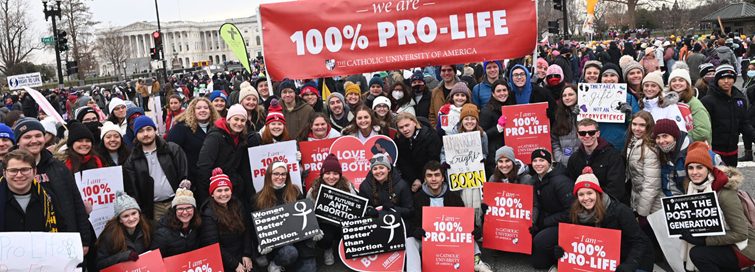The Post-Dobbs Pro-Life Battlefield: What We’ve Learned and What’s Next
On June 24, 2022, the Supreme Court’s decision in Dobbs v. Jackson Women’s Health Organization overturned Roe v. Wade. The majority opinion concluded that “the U.S. Constitution does not confer a right to abortion,” thereby restoring the authority to regulate abortion and protect life from conception to “the people and their elected representatives.”
While the long-sought and hard-fought overturning of Roe was a monumental victory for the pro-life movement, the Dobbs decision also opened the door to a new set of serious challenges. The battle quickly shifted to state-level regulations, where pro-life advocates now face intense, state-by-state fights to protect women and unborn lives.

Reflecting on the Losses: The Pro-Life Movement’s 0-7 Record
In the immediate aftermath of Dobbs, the pro-life movement was unprepared for the rapid response of the opposition. Seven significant ballot initiatives either expanded abortion access or blocked pro-life legislation. Each loss underscored the need for deeper, more precise voter engagement and education. Here’s a breakdown of those losses:
- Kansas (August 2, 2022)
Kansas voters rejected the Value Them Both Amendment, a vital measure that would have clarified that the state constitution does not support a so-called “right to abortion”. This heartbreaking defeat highlighted the power of emotional manipulation and the need for clearer, fact-based messaging to protect the unborn. - Kentucky (November 8, 2022)
Similar to Kansas, Kentucky voters also rejected an amendment affirming that the state constitution does not include a “right to abortion”. This loss not only underscores the need for clearer communication, but also emphasizes the importance of mobilizing voters to understand the profound moral and ethical stakes involved in defending life. Both outcomes reflect the challenge of countering emotional narratives with truth and clarity. - Michigan (November 8, 2022)
Proposal 3, a measure that enshrined “abortion rights” in the state’s constitution, was approved by a significant margin. The pro-abortion side successfully framed it as a protection of “personal freedom,” sidestepping the critical ethical discussions. - Montana (November 8, 2022)
The defeat of the Born-Alive Infant Protection Act, which would have ensured life-saving care for infants who survive abortion attempts, is a sobering reminder of how common-sense protections for the most vulnerable can be undermined by deceptive narratives. - California (November 8, 2022)
California voters passed Proposition 1, a radical measure that embedded an “unrestricted right to abortion” into the state’s constitution. This result underscores the daunting challenges pro-life advocates face in deeply pro-abortion states where life-affirming values are under relentless attack. - Vermont (November 8, 2022)
Vermont’s Proposal 5, which passed overwhelmingly, enshrined “reproductive autonomy” in the state constitution, allowing abortion at any stage of pregnancy. This tragic measure disregards the humanity of the unborn and promotes a culture of death over life. - Ohio (November 8, 2023)
Ohio voters not only rejected an attempt to make it harder to pass constitutional amendments, but also passed Issue 1, which codified reproductive rights in the state constitution, allowing abortion up to the point of fetal viability. This outcome emphasizes the critical need for a united and strategic pro-life effort to safeguard life in future elections.
The Current Fight: Pro-Life Ballot Initiatives in 2024
Now in 2024, the stakes are even higher, and the pro-life movement has the opportunity to turn the tide in 10 critical states. Each of these states will see abortion-related ballot measures that could either solidify or dismantle protections for the unborn.
Here’s a list of the key battleground states in the November 5, 2024 election:
- Florida
Facing Amendment 4, a dangerous measure that threatens to strip away parental involvement in their child’s abortion decisions and open the door to late-term abortions. If passed, this amendment would undo decades of pro-life protections in Florida, making it critical for pro-life advocates to take a stand. - Missouri
Pro-life advocates in Missouri are entrenched in a major battle against Amendment 3, which would not only overturn the state’s life-saving abortion ban, but also allow abortion in the 7th, 8th, and even 9th months of pregnancy. This extreme measure puts the lives of fully developed unborn children at risk. - Nebraska
Voters face competing measures: one to enshrine a 12-week abortion ban with exceptions for rape, incest, and life of the mother, and another to allow abortion until viability or later for the“health of the mother,” not clearly defined. The outcome could reshape the state’s abortion landscape. - Nevada
The Right to Reproductive Freedom Amendment would cement abortion access into Nevada’s constitution, ensuring “abortion rights” up to 24 weeks, and beyond in cases of “maternal health,” not clearly defined. - New York
A proposed constitutional amendment (Prop 1) aims to protect abortion access under the guise of “reproductive healthcare and autonomy,” raising concerns about the long-term implications for unborn lives. - South Dakota
Despite the state’s strong pro-life laws, Constitutional Amendment G threatens to weaken these protections by implementing a dangerous trimester-based framework that could lead to expanded abortion access. - Arizona
Arizona voters will decide whether to amend the state constitution to allow abortion up to 24 weeks, with exceptions for maternal physical or mental health. Pro-life advocates are mobilizing to oppose this measure, which could lead to unregulated abortion access. - Montana
Montana’s ballot measure would make it nearly impossible for the state to restrict abortion before viability, allowing abortion up until late stages of pregnancy under the guise of protecting the mother’s health. This initiative threatens to greatly expand abortion access. - Maryland
Maryland voters will decide whether to enshrine abortion rights into the state constitution (Question 1), codifying abortion access up to viability, further entrenching the state’s pro-abortion laws. - Colorado
Amendment 79 would enshrine the so-called “right to abortion” in the Colorado constitution, further cementing its status as a top abortion destination in the U.S. It would permanently remove parents from the equation, and also increase the influx into the state of human traffickers who take women there for forced abortions.
Cogency’s Role: A Strategic Path to Victory in 2024
The hard lessons from our first two years in the post-Dobbs landscape reveal one thing: the pro-life movement cannot afford outdated approaches, and we must adapt. Success in 2024 demands a refined, research-driven strategy that cuts through the noise and reaches voters with messages that resonate with their values – and the self-evident truth about the unalienable right to life as proclaimed in our nation’s founding documents.
At the heart of this strategy is Cogency’s precise, data-driven approach. By targeting specific demographics with tailored, relevant messaging, we can directly speak with voters on the issues that matter to them. This approach changes hearts, minds, and most importantly, encourages voters to vote in our favor.
Our plan includes:
- Targeted Messaging: Connecting with voters on what matters most to them – whether it’s parental rights or healthcare standards – ensuring every message hits its mark.
- Education & Engagement: Delivering compelling, fact-based narratives that dismantle the opposition’s deceptive tactics, creating long-term shifts in public opinion.
- Voter Mobilization: Driving turnout where it counts, especially in states where a simple majority can swing the vote.
- Fundraising for Impact: Bolstering financial support to fuel these efforts is essential. Every dollar raised powers targeted campaigns that amplify our message, reach more voters, and ensure pro-life victories.
With LIFE on the ballot in these 10 battleground states, 2024 is a pivotal moment for the pro-life movement. Through this focused strategy, we can start turning the tide and secure lasting protections for the unborn and safeguard life across the nation.




